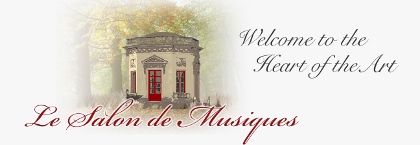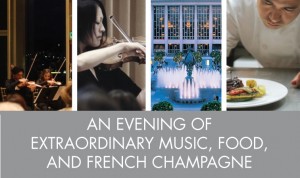COME BE IMPRESSED BY WHAT’S EXPRESSED
For the third concert of Le Salon de Musiques’ fifth season, Masters Rediscovered, French-American Pianist/Melodist and Artistic Director François Chouchan has selected the works of four composers, three of whom are mostly unknown but not because they lack genius. Chouchan’s carefully selected programs have proved time and again that seldom-played music doesn’t mean it lacks brilliance or accessibility. And musicologist Julius Reeder Carlson, who always offers perspicacious pre-talks at each of the season’s nine concerts, explicates why some people have never been acquainted with, or even heard of, these writers. Most astounding is that three of the five pieces in the concert on Sunday, December 7, will be U.S.A. premieres.
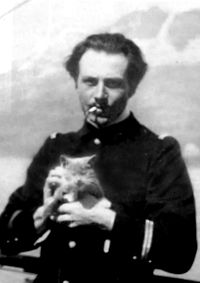 After the concert, you will be shaking your head in bemusement that three of the four composers on the program have been overlooked. Certainly we all know Maurice Ravel, who will be represented with his Sonata for Violin & Cello, dedicated to Claude Debussy, who died four years before its premiere in 1922. But are you familiar with Jean Cras, Arnold Bax, and Mikhail Gnesin?
After the concert, you will be shaking your head in bemusement that three of the four composers on the program have been overlooked. Certainly we all know Maurice Ravel, who will be represented with his Sonata for Violin & Cello, dedicated to Claude Debussy, who died four years before its premiere in 1922. But are you familiar with Jean Cras, Arnold Bax, and Mikhail Gnesin?
Despite a youthful passion for music and poetry, French composer Jean Cras (1879-1932) was the son of a Navy captain in Brest, and became a career naval officer; his travels to Africa and his sea voyages—along with his native Brittany—inspired his compositions. Cras was considered one of the leading figures in the French repertoire, but his fame evaporated quickly. He considered chamber music to be his forte, writing that “this refined musical form has become for me the most essential.” You will hear the U.S.A. premieres of both his Suite/Duo for Flute & Harp (1927) and Quintet for Flute, Harp and Strings (1928).
The son of a rabbi, Mikhail Fabianovitch Gnesin (1883-1957) was one of the leading Jewish musical voices to emerge in early 20th-century Russia, occupying a prominent place among the first generation of Soviet modernist composers. Gnesin came from a long line of Jewish musicians, and seven of his siblings went on to become famous as musicians or musical educators in Russian society. In 1895, five of his sisters established the Gnesin Musical Institute, where Gnesin taught from 1923 to 1935. This pioneering children’s music school still survives as the prestigious 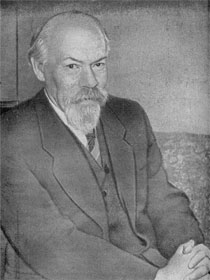 high school division of the Moscow Conservatory.
high school division of the Moscow Conservatory.
While he was associated with the early Russian avant-garde, composing song settings to many texts of Russian symbolist poets and futurist theater movement, he displayed a strong attachment to his Jewish cultural roots as well. From the 1920s to 1950s he wrote works on a variety of themes, including programmatic music on the Russian Revolution and folk music of other Soviet nationalities.
Step by step, and because of the Soviet regime’s pressure, his creative life slowed down. Like many Jewish artists, Gnesin faced increasing discrimination; his compositions were less prolific, as was his teaching career. The world of Jewish music entered an era of official non-existence, which may explain why he fell to the periphery of the repertoire. You will hear the U.S.A. premiere of his Songs of a Knight Errant, Op. 28, for two violins, viola, cello and harp (1929).
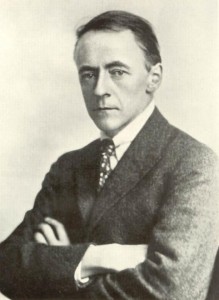 English composer Sir Arnold Edward Trevor Bax (1883-1953) came from a wealthy family, which probably explains why he never taught. His musical influences were chiefly Liszt, Wagner, and Strauss, but while still a student he discovered the poetry of W. B. Yeats, and, in his own words, “The Celt within me stood revealed.” He thereafter spent much of his life in Ireland, where he learned Gaelic and pursued a productive literary life under the pen-name Dermot O’Byrne.
English composer Sir Arnold Edward Trevor Bax (1883-1953) came from a wealthy family, which probably explains why he never taught. His musical influences were chiefly Liszt, Wagner, and Strauss, but while still a student he discovered the poetry of W. B. Yeats, and, in his own words, “The Celt within me stood revealed.” He thereafter spent much of his life in Ireland, where he learned Gaelic and pursued a productive literary life under the pen-name Dermot O’Byrne.
Thereafter, he was influenced by Irish folk music (earlier, through travels in Europe, he was inspired by Russian music: folk, concert, and especially liturgical). Later in life he discovered an equal affinity for Scandinavia and formed a sort of mutual admiration society with Sibelius. Bax, a self-described “brazen Romantic,” used music for primarily expressing emotional states; he was not interested in abstract sound for its own sake. Pieces in his huge catalog (including 7 symphonies) have known popularity, yet Bax causes scarcely a blip on the international radar. He does garner more notoriety for chamber music: Le Salon will offer his Fantasy Sonata for Harp & Viola (1927).
The artists for this concert are truly L.A.’s finest and most in-demand: Angela Wiegand (flute), Marcia Dickstein (harp), Jessica Guideri & Erik Arvinder (violins), Rob Brophy (viola), and co-Artistic Director John Walz (cello). As always, expect a Q&A with the artists, French champagne, and a buffet supplied by Patina.
Expressionist & Impressionist
Le Salon de Musiques
Dorothy Chandler Pavilion | 5th Floor
135 North Grand Avenue
Sunday December 7, 2014 at 4:00 pm
for tickets and info, call (310) 498-0257 or visit www.leSalondeMusiques.com
